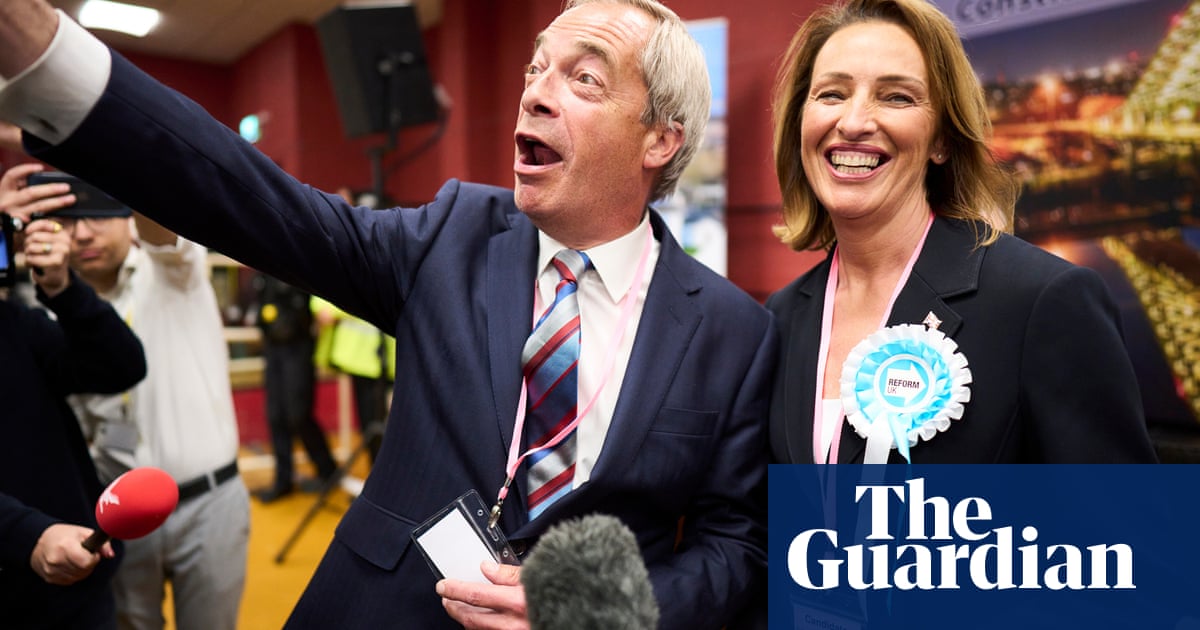The boss, as aides call him, was on his way. It was 2.30am and Nigel Farage had arrived at a Cheshire leisure centre, ready to declare victory in the closely-foughtRuncorn and Helsby byelection.
But as camera crews gathered,Reform UKofficials who were ready to welcome their leader frantically scrambled back to the ballot boxes. The result, it seemed, was too close to call.
It would be another three hours before Farage sauntered into the DCBL Stadium, looking relaxed despite the knife-edge contest that had left his sleep-deprived aides looking increasingly frazzled. The 61-year-old laughed off claims he had spent daybreak touring Widnes after aborting his earlier grand entrance. He had, he said, been “having a quiet drink”. By 6am, it was time to toast victory.
“It’s a very, very big moment, absolutely no question,” declared the perma-tanned populist, as his party grasped hold of one of Labour’s safest seats by just six votes after a dramatic recount. It was the narrowest parliamentary byelection win this century.
As Farage’s aides celebrated in the stadium car park – one puffing on a large cigar – the leader planned a victory lap of England. His once-fringe party was now centre stage, gaining a fifth MP, hundreds of council seats, a regional mayor and at least seven county councils from Durham to Staffordshire and Lincolnshire. He had decimated Kemi Badenoch’sConservativesand dealt a damaging blow to Labour.
On the southern banks of the River Mersey inCheshire, from the post-industrial town of Runcorn to the Conservative villages around Frodsham, Reform UK had united an uneasy coalition of voters against Labour. One party activist described its supporters as a combination of “those who set their alarm for work in the morning and are angry at those who don’t – and those who don’t”.
Labour, meanwhile, had relied on those who despise Farage – and they span all political shades – but it was not enough to save their 14,700-vote majority. Many had voted for Reform UK as a protest against the government. Others expressed their displeasure more creatively. “I’ve never seen so many drawings of penises,” said one seasoned Labour campaigner after examining spoiled ballot papers.
The discontent was palpable on Friday in Murdishaw, a 1970s housing estate in Runcorn where barely one in four voted in Thursday’s contest – the lowest turnout in the constituency. A 65-year-old retiree, who forgot to vote, was horrified when told by the Guardian that Reform had won by just six votes. “Oh you’re kidding me. I’m not happy about that,” she said, adding: “I forgot all about [the election]. If only I’d remembered.”
Underlying Reform UK’s dismantling of the historic two-party system in Westminster is a much more troubling trend: the growing numbers of voters detaching completely from politics. “I don’t see any point in any of them. They really are all horrible. Once they’ve been voted in, they forget about us,” said Tommy Young, 59, outside Murdishaw’s Co-op.
Reform’s candidate, Sarah Pochin, a former Conservative councillor and local magistrate, becomes the first non-Labour MP elected by Runcorn in more than half a century.
But 200 miles across northern England, Reform gained its most powerful role yet as Andrea Jenkyns, a former Tory MP, was crowned mayor of the newly created authority of GreaterLincolnshirewith a thumping 40,000-vote lead over the Conservatives.
Voters will now look to Greater Lincolnshire, Durham and Staffordshire to see what Reform UK can do in power. On the east coast, Jenkyns has pledged to ape Elon Musk’s cost-cutting “department of government efficiency” by launching a “Doge Lincolnshire”.
A close ally of Boris Johnson, Jenkyns wasted no time in burnishing her hard-right credentials in her victory speech, telling the count centre in Grimsby that vulnerable asylum seekers should be forced to sleep in tents rather than housed in hotels. “Tents are good enough for France, they should be good enough for here in Britain,” she said.
Speaking at a celebratory rally later on Friday at a working men’s club inCounty Durham, Farage made a similar point, saying Reform-run areas would “resist” efforts by central government to house asylum seekers locally. The elections were “a truly historic landmark”, he declared.
Back in Cheshire, Conservative voters in the leafy village of Kingsley, which recorded the constituency’s highest turnout, were cheering Labour’s defeat. “It’s gone from Labour and that’s a good thing,” said one cheerful retiree.
At Kingsley community centre, Labour voter Steve Easton, 56, said he believed the byelection was won as a result of divisive national concerns such as immigration rather than local issues.
“I think there’s been a lot of noise created around this and a lot of noise by Reform,” he said. “It’s this big-picture politics, making statements about illegal immigrants – who are not the same as asylum seekers – and trying to bias the views of the public.”
